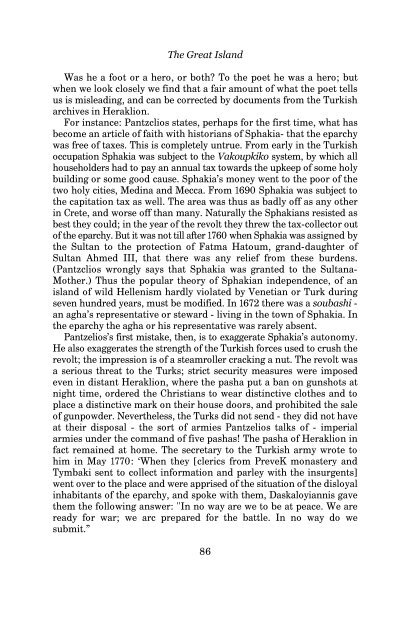free download here - Michael Llewellyn-Smith
free download here - Michael Llewellyn-Smith
free download here - Michael Llewellyn-Smith
You also want an ePaper? Increase the reach of your titles
YUMPU automatically turns print PDFs into web optimized ePapers that Google loves.
The Great Island<br />
Was he a foot or a hero, or both? To the poet he was a hero; but<br />
when we look closely we find that a fair amount of what the poet tells<br />
us is misleading, and can be corrected by documents from the Turkish<br />
archives in Heraklion.<br />
For instance: Pantzclios states, perhaps for the first time, what has<br />
become an article of faith with historians of Sphakia- that the eparchy<br />
was <strong>free</strong> of taxes. This is completely untrue. From early in the Turkish<br />
occupation Sphakia was subject to the Vakoupkiko system, by which all<br />
householders had to pay an annual tax towards the upkeep of some holy<br />
building or some good cause. Sphakia’s money went to the poor of the<br />
two holy cities, Medina and Mecca. From 1690 Sphakia was subject to<br />
the capitation tax as well. The area was thus as badly off as any other<br />
in Crete, and worse off than many. Naturally the Sphakians resisted as<br />
best they could; in the year of the revolt they threw the tax-collector out<br />
of the eparchy. But it was not till after 1760 when Sphakia was assigned by<br />
the Sultan to the protection of Fatma Hatoum, grand-daughter of<br />
Sultan Ahmed III, that t<strong>here</strong> was any relief from these burdens.<br />
(Pantzclios wrongly says that Sphakia was granted to the Sultana-<br />
Mother.) Thus the popular theory of Sphakian independence, of an<br />
island of wild Hellenism hardly violated by Venetian or Turk during<br />
seven hundred years, must be modified. In 1672 t<strong>here</strong> was a soubashi -<br />
an agha’s representative or steward - living in the town of Sphakia. In<br />
the eparchy the agha or his representative was rarely absent.<br />
Pantzelios’s first mistake, then, is to exaggerate Sphakia’s autonomy.<br />
He also exaggerates the strength of the Turkish forces used to crush the<br />
revolt; the impression is of a steamroller cracking a nut. The revolt was<br />
a serious threat to the Turks; strict security measures were imposed<br />
even in distant Heraklion, w<strong>here</strong> the pasha put a ban on gunshots at<br />
night time, ordered the Christians to wear distinctive clothes and to<br />
place a distinctive mark on their house doors, and prohibited the sale<br />
of gunpowder. Nevertheless, the Turks did not send - they did not have<br />
at their disposal - the sort of armies Pantzelios talks of - imperial<br />
armies under the command of five pashas! The pasha of Heraklion in<br />
fact remained at home. The secretary to the Turkish army wrote to<br />
him in May 1770: ‘When they [clerics from PreveK monastery and<br />
Tymbaki sent to collect information and parley with the insurgents]<br />
went over to the place and were apprised of the situation of the disloyal<br />
inhabitants of the eparchy, and spoke with them, Daskaloyiannis gave<br />
them the following answer: "In no way are we to be at peace. We are<br />
ready for war; we arc prepared for the battle. In no way do we<br />
submit.”<br />
86


